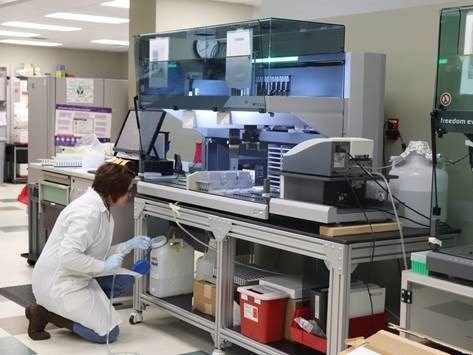
The Centers for Disease Control and Prevention (CDC) says people can get histoplasmosis after breathing in the microscopic fungal spores from the air. Although most who breathe in the spores don’t get sick, Wheat says the infection can be dangerous for people with weakened immune systems. It’s most common in the Midwest, and Wheat says it’s likely about 90 percent of people living in Tennessee have had the infection.
“[Diagnostics] are really important in areas where these fungal infections are seen,” says Wheat. “If these tests aren’t available, there are [immunocompromised] patients who would die without treatment, or would be much sicker by the time they’re diagnosed and have a more difficult response to treatment.”
Wheat says MiraVista performs the bulk of fungal infection testing for the U.S. Humans comprise about two-thirds of its testing, but the company also tests veterinary patients. Most samples arrive at the Indianapolis facility from reference labs and academic medical centers throughout the country.
Wheat developed the proprietary test in the late 1980s as an infectious disease specialist at the Indiana University School of Medicine. He left the university in 2002 to start MiraVista, which began with just five employees, but has now grown to 50.
The company is anticipating to expand even more quickly as it develops a new kind of test for histoplasmosis. Unlike the enzyme assay that requires high-tech equipment in MiraVista’s clinical lab, Wheat says the new diagnostic “is a rapid test, like a pregnancy test that can be performed in the local lab on small numbers of samples.”
A trial testing MiraVista’s rapid diagnostic is underway in Latin America, with a second scheduled to start soon. Wheat says the standard method in Latin America to detect histoplasmosis is to examine a tissue sample under a microscope, which can be a barrier for easy diagnosis.
“There’s probably more histoplasmosis in Latin America than the U.S.,” says Wheat. “It’s common in most Latin American countries, so a rapid test will be very important there. We’re going to put a lot of emphasis on [the trials] in the next two years to try to make [the rapid test] available there.”
While most of its work focuses on histoplasmosis, MiraVista also tests for blastomycosis and coccidioidomycosis, more commonly known as Valley fever, which can be severe even in healthy people. The National Institutes of Health awarded a grant to MiraVista to also develop a rapid test for Valley fever.
The CDC says about 10,000 cases of Valley fever are reported each year, mostly in the Southwest, but tens of thousands more likely occur and are misdiagnosed, because many patients are not tested for the condition.
Wheat says the company’s growth over the last two years has enabled it to work on demanding projects, such as expanding to Latin America. He expects the number of employees at MiraVista to double—reaching 100—in the next two years as it implements new tests and further develops diagnostics in its pipeline.
“We are doubling the size of our building and recruiting more scientists who can bring new ideas to research. We have facilities here to manufacture kits, develop kits and add new services,” says Wheat. “Our veterinarian practice is probably only a quarter of what it could be, once we implement better marketing. We have a lot going on this year we think will take us to another level.”

 Histoplasmosis isn’t top of mind for most people, but if you’re a Hoosier, it’s likely that you’ve had it. MiraVista Diagnostics Medical Director and President Dr. Lawrence Joseph Wheat says about half of people living in Indiana have had histoplasmosis, an infection caused by a fungus that can be found in soil containing large amounts of bird or bat droppings. Building on nearly two decades of infectious disease testing, the Indianapolis-based company is on the cusp of major growth that could make detecting fungal infections faster and more efficient.
Histoplasmosis isn’t top of mind for most people, but if you’re a Hoosier, it’s likely that you’ve had it. MiraVista Diagnostics Medical Director and President Dr. Lawrence Joseph Wheat says about half of people living in Indiana have had histoplasmosis, an infection caused by a fungus that can be found in soil containing large amounts of bird or bat droppings. Building on nearly two decades of infectious disease testing, the Indianapolis-based company is on the cusp of major growth that could make detecting fungal infections faster and more efficient.
